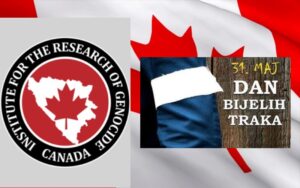11. 18. 2017.
The international expert team of the Genocide Research Institute, Canada, has recognized and assessed the Ratko Mladic judgment as historical for the work of the Hague Tribunal, as well as establishing a legal and historical court image of the nature of the war in Bosnia and Herzegovina.
Genocide and the joint criminal enterprise are the hardest war crimes qualifications in the Hague Tribunal Statute. They are contained in the indictment against Mladic. As a key figure of the joint criminal enterprise, Mladic is charged with the permanent removal of Bosniaks, Bosnian Croats and other non-Serbs from large parts of Bosnia and Herzegovina. We are waiting for a verdict with legal justice by which Mladic is found guilty and responsible for the genocide committed in Srebrenica, and 6 other municipalities in Bosnia and Herzegovina. This is based on the discovery of the largest, massive, primary grave site, Tomašica which is located near Prijedor, which confirms the extent of aggression on Bosnia and Herzegovina and proves the genocide against its citizens in Prijedor. Tomasica is not a secondary grave site, that is, it was not a place where bodies from other graves were subsequently brought together. It is the primary mass grave, which is marked as such and brutally realized, and testifies to the darkest side of the human mind, believed to have been defeated forever after the Holocaust.
The fact is that Bosniaks are the first people after the Second World War who have a written verdict for genocide. However, genocide can not be localized in one part of the territory of Bosnia and Herzegovina. The crime of genocide is not a crime over the territory, but a crime against a particular ethnic or religious group, which legal justice needs to confirm. We also expect historical justice. We believe that this verdict should confirm the crime not only at the level of the Republika Srpska entity, but through proven joint criminal enterprises and the direct linkage between Mladic and the political, military and police establishment of previous Serbia. This is based on the facts and evidence of the science of genocide that undoubtedly affirms that Serbia with its armed forces, the Yugoslav People’s Army, or the Republika Srpska Army led a war of war against Bosnia and Herzegovina, carried out armed actions aimed at the goal of a genocidal, political project, the formation of a single Serbian state in the Balkans. All relevant sources and their knowledge prove and confirm that prior to the aggression against Bosnia and Herzegovina and the commission of genocide against Bosniaks, in accordance with the Serbian nationalist ideology and politics, genocidal character, there was an intention clearly expressed through the plan and project, for the execution of aggression, genocide and other forms of crimes against humanity and international law, preceded by certain individuals who planned, organized and targeted political, military and other preparations.The state, political and military leadership of Serbia planned, prepared, organized and participated in the commission of crimes against humanity and international law, including the crime of genocide, in Bosnia and Herzegovina with the intention and clearly set goals and established tasks. Mladic and all officers, and members of the 30th Personnel Center of the General Staff of the Army of Yugoslavia, as well as other commands, units and institutions of the Army of Yugoslavia, were under the domestic legislation of Serbia. The acts of genocide in Bosnia and Herzegovina were performed by: legal and natural persons, who had the status of the organs of Serbia. Legal and physical persons were completely dependent on Serbia, and as such they were equated with the organs of Serbia. Republika Srpska and the Republika Srpska Army were just mere instruments of Serbia without any real, political and military autonomy, through which Serbia operated. The political and military organization of the parastatal creation of the Republic of Srpska is equal to the organs of Serbia and is completely depended on Serbia, whose works are attributed to Serbia.The political, military and financial assistance and resources provided by Serbia to the Republika Srpska and the Army of the Republika Srpska proves that genocide and other forms of crimes against humanity and international law in Bosnia and Herzegovina, including the crime of genocide against Bosniaks, were committed by Serbia.
Only with legal and historical justice can we build trust, peace, stability and a better common future. These conditions that will ultimately lead to apology, catharsis and seeking forgiveness from criminals towards victims.
Institute for Research of Genocide Canada



